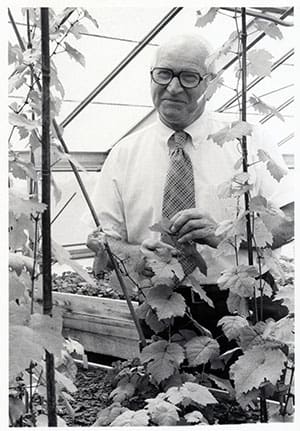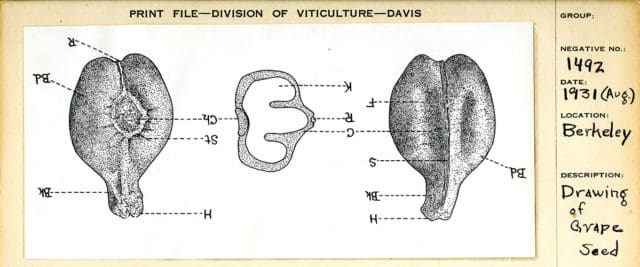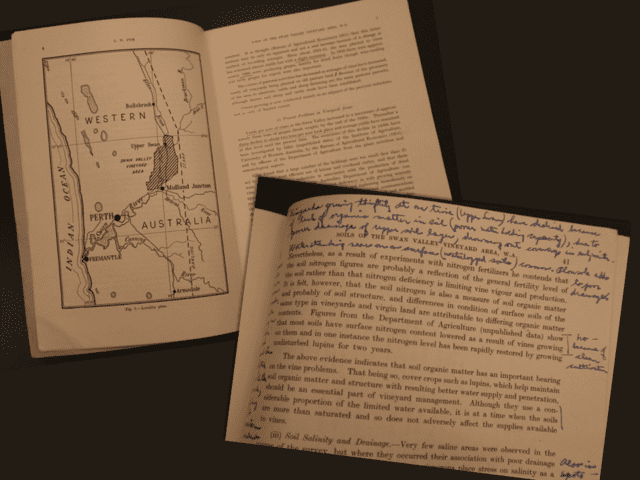 The UC Davis Library announced today that it received a $200,000 gift from the owners of Larkmead Vineyards, Cameron “Cam” Baker and Kate Solari Baker, to preserve the work of one of California’s most influential viticulture researchers, the late Professor Emeritus Harold Olmo.
The UC Davis Library announced today that it received a $200,000 gift from the owners of Larkmead Vineyards, Cameron “Cam” Baker and Kate Solari Baker, to preserve the work of one of California’s most influential viticulture researchers, the late Professor Emeritus Harold Olmo.
The donation will allow the UC Davis Library, which has been called “the world’s greatest wine library,” to digitize and broadly share Olmo’s work on viticulture, grape breeding and the suitability of grape varieties to different climates and terrains from around the world.
“We are honored to partner with Cameron Baker and Kate Solari Baker of Larkmead Vineyards to digitize Dr. Olmo’s work,” said University Librarian and Vice Provost of Digital Scholarship MacKenzie Smith. “As we preserve and increase access to these documents, we hope to uncover elements of Olmo’s research that could provide new insight into modern-day viticulture practices. This project is a powerful example of how, through digital scholarship, we can connect the past with the present to better inform the future.”
The library’s collection includes more than 30,000 wine books, papers and rare manuscripts dating back as far as 1287. Additionally, it includes papers and books from such renowned figures as wine writers Hugh Johnson and Jancis Robinson; the late winemaker Robert Mondavi; and Olmo’s well-known fellow colleague in the UC Davis Department of Viticulture and Enology, the late Maynard Amerine.

Drawing of Grape Seed (Harold Paul Olmo Papers, Archives and Special Collections)
Founded in 1895 just north of St. Helena, Larkmead Vineyards is one of the oldest family-owned establishments in Napa Valley. It is now under the stewardship of Cam Baker and Kate Solari Baker, who said they made the donation to the library in honor of the vineyard’s 125th anniversary, which will be celebrated in 2020, and because of the university’s strong reputation.
“UC Davis has an unparalleled reputation in the wine industry, with the leading viticulture and enology program and the best wine library in the world,” Kate Solari Baker said. “Given the university’s importance for the global wine industry and its strong ties to the Napa Valley, we felt very confident that UC Davis was the ideal fit for this project and gift.”
The couple added that the prestige of Olmo’s work and the potential to share it with researchers and professionals across all disciplines also inspired them to make the gift.
“Dr. Olmo was one of the most influential viticulturists of the 20th century,” Cam Baker said. “Napa Valley owes much of its success as a wine region to him. It’s our hope that through the digitization and analysis of Dr. Olmo’s research by the UC Davis Library, more findings will come to light that will guide Napa Valley into its next chapter.”
The library will digitize the Harold P. Olmo Papers over the next year. To request access to materials from the collection, contact Archives and Special Collections at SpecColl@ucdavis.edu.
The Indiana Jones of viticulture
Olmo, who was one of the world’s foremost viticulturalists, joined the UC Davis Department of Viticulture and Enology in 1938. He played an integral role, alongside Amerine, in building the university’s international reputation in wine.
During his 40-year career, Olmo released more than 30 wine and table grape varieties, including Red Globe, Perlette, Ruby Seedless, Ruby Cabernet and Rubired. He is best known, however, for developing the Oakville clones that would eventually cement Napa Valley’s reputation as one of the world’s premier wine regions. Olmo’s clones are still widely planted today; it is due in large part to his research efforts that Cabernet Sauvignon remains the star variety of Napa Valley. Experts also credit his research to improve fruit quality and productivity with enabling the expansion of Chardonnay, now California’s most widely planted grape variety.
Olmo also traveled all over the world to discover different grape varieties and species, amassing one of the world’s most extensive grape collections and earning him the nickname the “Indiana Jones of viticulture.”
“To me, Dr. Olmo’s work was fearless. He always went one step further to find the answer,” said Larkmead winemaker Dan Petroski. “He’s an iconic figure, and the only way for his work to become timeless is to digitize it.”
Possible clues for viticulture in the age of climate change
Olmo’s travels to Western Australia in 1955 to study how climate changes were impacting viticulture practices in the Swan Valley transformed Australian winemaking for generations. This research, which will now be made available through the Larkmead-UC Davis Library partnership, could yield clues to how California winemakers and grape growers might adjust their farming practices to better adapt to climate change.
Larkmead Vineyards is already taking a page from Olmo’s notebook, and has announced the planting of a three-acre research block that will host different varieties, clones, and rootstocks for experimentation as climate change affects Napa Valley.

Olmo’s 1940 map of the location of each vine in this test plot dates to when Larkmead was still owned by Swiss winemaker Felix Salmina; the Solari family bought the property in 1948. (Harold Paul Olmo Papers, Archives and Special Collections)
The Larkmead-Olmo connection
Olmo first planted a clonal station at Larkmead in 1939. When the Solari family purchased the estate in 1948, owner Larry Solari and Olmo became fast friends. Olmo shared critical advice on rootstocks and clonal research, in addition to infusing a culture of experimentation at Larkmead. Their connection was such that in 2015 Larkmead created a label called “Dr. Olmo” to honor the late professor and his influence on the vineyard. To create this Cabernet Sauvignon, Larkmead used only grapes from the parcel where Olmo’s research vineyard was planted.
“In the short term, Dr. Olmo’s incredible knowledge and experience certainly helped contribute to our family’s early success as a grape grower. The fact that Dr. Olmo chose to develop his clonal station at Larkmead also helped build the vineyard’s reputation for top quality terroir in Napa Valley,” Solari Baker said. “But the true effects of Dr. Olmo’s research are long term. Today, we actually have Dr. Olmo’s groundbreaking Oakville clones planted in the vineyard, meaning that our Cabernet Sauvignon wines are in part a direct result of his work and legacy.”
Celebrating 125 years
With the vineyard’s 125th anniversary approaching in 2020, the owners of Larkmead said it was “very fitting to take the time now to honor Dr. Olmo’s work” and preserve his discoveries so they could be shared with the world.
“By reflecting on our past and learning all we can from it, we will be better prepared for our next 125 years here in Napa Valley,” Solari Baker said.
Petroski added, “We’re looking back, and giving back, so we can propel ourselves forward.”














